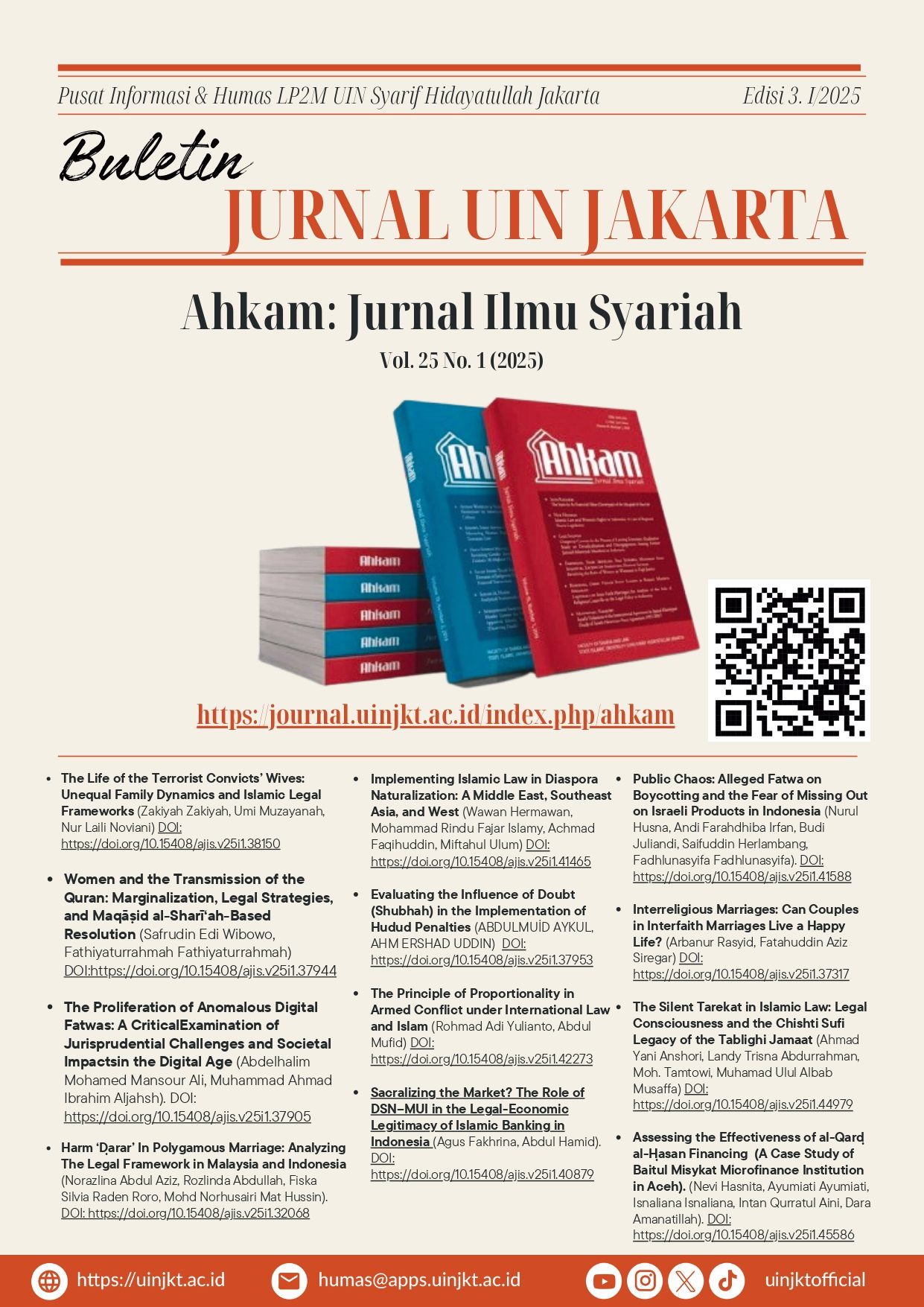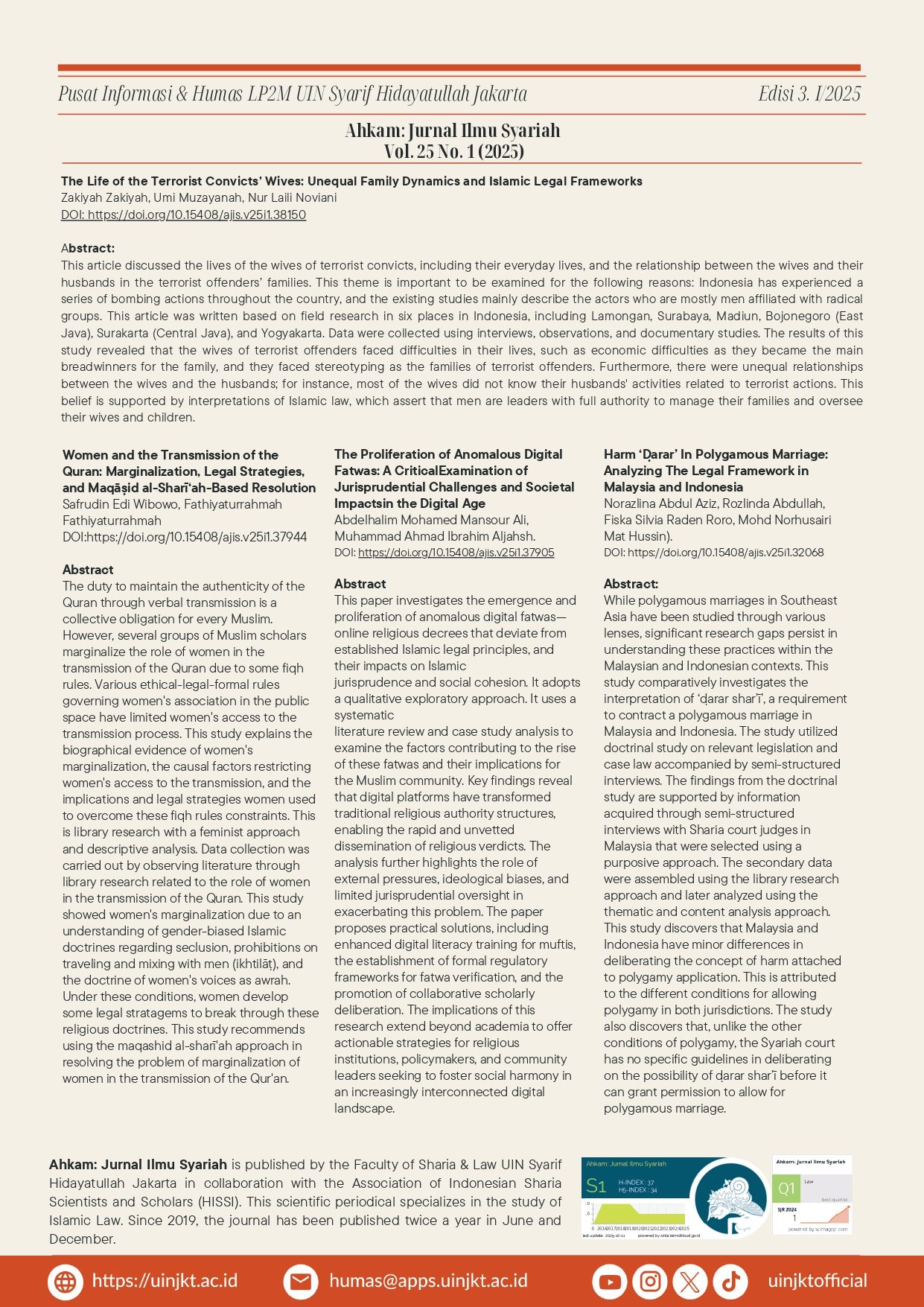AHKAM Journal Releases Its Latest Edition, Exploring Contemporary Issues in Islamic Law and Society
Rectorate Building, UIN Online News — AHKAM: Jurnal Ilmu Syariah of Syarif Hidayatullah State Islamic Jakarta has published its latest issue, Volume 25, Number 1 (2025). In this issue, the respected scholarly journal includes 12 research articles that discuss important topics like Islamic law, gender equality, digital fatwas, and how Sharia is applied in different social settings around the world.
The edition opens with an article by Zakiyah Zakiyah, Umi Muzayanah, and Nur Laili Noviani, titled The Life of the Terrorist Convicts’ Wives: Unequal Family Dynamics and Islamic Legal Frameworks. The paper investigates the inequitable familial dynamics faced by the spouses of terrorism convicts and evaluates the capacity of Islamic legal frameworks to foster enhanced justice and equity.
An article by Safrudin Edi Wibowo and Fathiyaturrahmah called Women and the Transmission of the Quran: Marginalization, Legal Strategies, and Maqāṣid al-Sharī‘ah-Based Resolution also focuses on women's issues. The study analyzes women’s efforts to preserve Qur’anic transmission traditions amid social and cultural marginalization.
Contemporary religious phenomena are discussed in a paper by Abdelhalim Mohamed Mansour Ali and Muhammad Ahmad Ibrahim Aljahsh, titled The Proliferation of Anomalous Digital Fatwas. The spread of unverified online fatwas presents jurisprudential challenges and social implications, which this article examines.
In the area of Islamic family law, Norazlina Abdul Aziz and her colleagues present Harm (‘Ḍarar’) in Polygamous Marriage, comparing legal frameworks between Malaysia and Indonesia. Meanwhile, Wawan Hermawan and his team contribute Implementing Islamic Law in Diaspora Naturalization: A Middle East, Southeast Asia, and West Study, which investigates how Islamic law operates within diaspora naturalization contexts across three regions.
Criminal law and conflict-related topics are explored by Abdulmuid Aykul and Ahm Ershad Uddin in Evaluating the Influence of Doubt (Shubhah) in the Implementation of Hudud Penalties and by Rohmad Adi Yulianto and Abdul Mufid in The Principle of Proportionality in Armed Conflict under International Law and Islam.
Agus Fakhrina and Abdul Hamid, in their article Sacralizing the Market, represent Islamic economics. The article The Role of DSN–MUI in the Legal-Economic Legitimacy of Islamic Banking in Indonesia sheds light on how the National Sharia Council (DSN–MUI) shapes the legal and economic legitimacy of Islamic banking in Indonesia.
Another timely contribution comes from Nurul Husna and her co-authors in Public Chaos: Alleged Fatwa on Boycotting and the Fear of Missing Out on Israeli Products in Indonesia. The paper examines the social and psychological factors underlying public calls for a boycott of Israeli products in Indonesia.
This issue also features several other engaging studies, including Arbanur Rasyid and Fatahuddin Aziz Siregar on interfaith couples’ happiness; Ahmad Yani Anshori and his team on the legal consciousness within the Tablighi Jamaat movement; and Nevi Hasnita and her colleagues on the effectiveness of al-Qard al-Hasan financing schemes in microfinance institutions in Aceh.
More articles are listed below:
- The Life of the Terrorist Convicts’ Wives: Unequal Family Dynamics and Islamic Legal Frameworks (Zakiyah Zakiyah, Umi Muzayanah, Nur Laili Noviani)
- Women and the Transmission of the Quran: Marginalization, Legal Strategies, and Maqāṣid al-Sharī‘ah-Based Resolution (Safrudin Edi Wibowo, Fathiyaturrahmah Fathiyaturrahmah)
- The Proliferation of Anomalous Digital Fatwas: A CriticalExamination of Jurisprudential Challenges and Societal Impactsin the Digital Age (Abdelhalim Mohamed Mansour Ali, Muhammad Ahmad Ibrahim Aljahsh)
- Harm ‘Ḍarar’ In Polygamous Marriage: Analyzing The Legal Framework in Malaysia and Indonesia (Norazlina Abdul Aziz, Rozlinda Abdullah, Fiska Silvia Raden Roro, Mohd Norhusairi Mat Hussin)
- Implementing Islamic Law in Diaspora Naturalization: A Middle East, Southeast Asia, and West (Wawan Hermawan, Mohammad Rindu Fajar Islamy, Achmad Faqihuddin, Miftahul Ulum)
- Evaluating the Influence of Doubt (Shubhah) in the Implementation of Hudud Penalties (ABDULMUİD AYKUL, AHM ERSHAD UDDIN)
- The Principle of Proportionality in Armed Conflict under International Law and Islam (Rohmad Adi Yulianto, Abdul Mufid)
- Sacralizing the Market? The Role of DSN–MUI in the Legal-Economic Legitimacy of Islamic Banking in Indonesia (Agus Fakhrina, Abdul Hamid)
- Public Chaos: Alleged Fatwa on Boycotting and the Fear of Missing Out on Israeli Products in Indonesia (Nurul Husna, Andi Farahdhiba Irfan, Budi Juliandi, Saifuddin Herlambang, Fadhlunasyifa Fadhlunasyifa)
- Interreligious Marriages: Can Couples in Interfaith Marriages Live a Happy Life? (Arbanur Rasyid, Fatahuddin Aziz Siregar)
- The Silent Tarekat in Islamic Law: Legal Consciousness and the Chishti Sufi Legacy of the Tablighi Jamaat (Ahmad Yani Anshori, Landy Trisna Abdurrahman, Moh. Tamtowi, Muhamad Ulul Albab Musaffa)
- Assessing the Effectiveness of al-Qarḍ al-ḤasanFinancing (A Case Study of Baitul Misykat Microfinance Institution in Aceh) (Nevi Hasnita, Ayumiati Ayumiati, Isnaliana Isnaliana, Intan Qurratul Aini, Dara Amanatillah)


(Fathan Rangga, Meisa Aqila N.H./Nosa Idea.L/Kareena Auliya J./Zaenal M./Muhamad Arifin Ilham)

